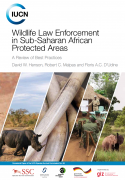 5 July 2016: Sustained, well-targeted actions in patrolling, management and intelligence gathering are key to successful wildlife law enforcement, concludes a publication by the International Union for Conservation of Nature (IUCN) and the German Corporation for International Cooperation (GIZ). The publication presents principles of best practice in tackling wildlife poaching and trafficking in Sub-Saharan African protected areas to support actions by protected area managers and other stakeholders. It emphasizes the importance of strong connections between governance and practice.
5 July 2016: Sustained, well-targeted actions in patrolling, management and intelligence gathering are key to successful wildlife law enforcement, concludes a publication by the International Union for Conservation of Nature (IUCN) and the German Corporation for International Cooperation (GIZ). The publication presents principles of best practice in tackling wildlife poaching and trafficking in Sub-Saharan African protected areas to support actions by protected area managers and other stakeholders. It emphasizes the importance of strong connections between governance and practice.
“There is no substitute for a well-equipped, well-trained and highly motivated ranger,” concludes ‘Wildlife Law Enforcement in Sub-Saharan African Protected Areas.’ The report reviews the most successful approaches to combating wildlife crime, as identified by practitioners and rangers. It also underscores the importance of strengthening wildlife law enforcement capacity at site and national levels to stop poaching and related illicit activities.
Another key finding of the report is that there are no universal, stand-alone solutions to tackling poaching in protected areas. The report recommends addressing a broad, cross-section of related issues and recognizing that differences in species, geographies and resources influence approaches and outcomes. The report further acknowledges that some approaches may require the sustained investment of time and resources to implement.
The publication “emphasizes the need to go beyond enforcement and work with local communities,” said Deputy Director of IUCN’s Global Species Programme, Jean-Christophe Vié. He called for diverse, complementary efforts along the supply chain from Africa and Asia; law enforcement; and dissemination of best practices to combat poaching and illegal trade in wildlife.
IUCN and GIZ conducted the review in cooperation with the Conservation Development Centre (CDC) and the Frankfurt Zoological Society (FZS). [IUCN Press Release] [Publication: Wildlife Law Enforcement in Sub-Saharan African Protected Areas] [GIZ Website]